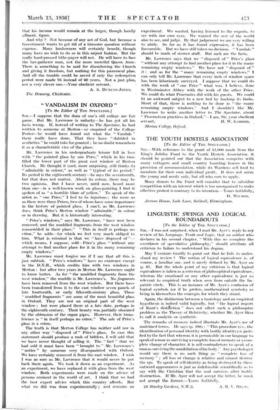" VANDALISM IN OXFORD "
[To the Editor of THE SPECTATOR.] Si 11,-1 suppose that the dons of one's old college are fair. game. But Mr. Lawrence is unlucky—he has got all his facts wrong. If, instead of writing to The Spectator, he had written to someone at Merton—or enquired of the College Porter—he would have found out what the " Vandals "' there really have done. That they have " dabbled in aesthetics " he could take for granted ; he no doubt remembers it as a characteristic vice of the place.
Mr. Lawrence in his undergraduate leisure fell in love with " the painted glass by one Price," which in his time filled the lower part of the great east window of Merton Church. He thought it (and, more surprising, still thinks it) "-admirable in colour," as well as " typical of its -period." Its period is the eighteenth century—he says the seventeenth, but that does not matter. About its colour, there may be two opinions. But I have never, until now, heard more than one—in a well-known work on glass-painting I find it spoken of as " a horrible blare of yellow." To speak of the artist: as one Price," I- feel to be injurious ; the more so as there were three Prices, two of whom have some importance' in the history of painted glass. .I can't, as Mr. Lawrence. does, think Price's Merton window " admirable," in colour or in drawing. But it is historically interesting.
"Price's windows," says Mr. Lawrence, " have now been removed, and the muddled fragments from the west window reassembled in their place." " This in itself is perhaps no crime," he adds—for which we feel very much obliged to him. What is criminal is that we " have disposed of "- which means, I suppose, sold—Price's glass " without any attempt to find another place for it in the many remaining' empty windows."
Mr. Lawrence must forgive me if I say that all this is just rubbish. " Price's windows " have no existence except in the D.N.B., which credits him with two windows in Merton ; but after two years in Merton Mr. Lawrence ought to know better. As for " the muddled fragments from the west window," the muddle is Mr. Lawrence's. No fragments have been removed from the west window. But there have been transferred from it to the east window seven panels of late fourteenth, or early fifteenth-century glass. These " muddled fragments " are some of the most beautiful glass in Oxford. They are not an original part of the west window ; but were placed there at a late date, perhaps in the eighteenth century. Their beauty was partially obscured by the obtrusion of the organ pipes. However, their trans- ference is " in itself perhaps no•crime." The sale of'Price's glass is a crime.
The truth is that Merton College has neither sold nor in
any other way " disposed of " Price's glass. In ease this statement should produce a rush of bidders, I will add that we have never thought of selling it. The " fact" that we had sold it must have been " brought to Mr. Lawrence's " notice " by someone very ill-acquainted with Oxford. We have certainly removed it from the east window. I wish I was as sure as Mr. Lawrence that it would never be put back there again. We took it down as an experiment. As an experiment, we have replaced it with glass from the west window. Both experiments were made - on the advice of persons eminent in the world of art. I think that we had the best expert advice which this country affords. But what we did was done experimentally ; and .remains an experiment. We wanted, having listened to the experts, to see with Our own eyes. We wanted the rest of the world also to see, and judge. By that judgement we are very willing to abide. So far as it has found expression, it has been favourable. But we have still taken no decision. " Vandals " should be made of sterner stuff. But such are the facts.
Mr. Lawrence says that we " disposed of " Prier's glass "without any attempt to find another place for it in the many remaining empty windows." We have not " disposed of " it ; and as for the " many remaining empty windows," I can only tell Mr. Lawrence that every inch of window space has been laboriously surveyed. I suppose that we could do with the work of " one Price " what was, I believe, done in Westminster Abbey with the work of the other Price.- We could do what Procrustes did with his guests. We could' fit an awkward subject to a new bed by hacking its limbs. Short of that, there is nothing to be done in " the many remaining empty windows." And I shouldn't like Mr. Lawrence to write another letter to The Spectator, about " Procrustean practices in Oxford."—I am, Sir, your obedient














































 Previous page
Previous page